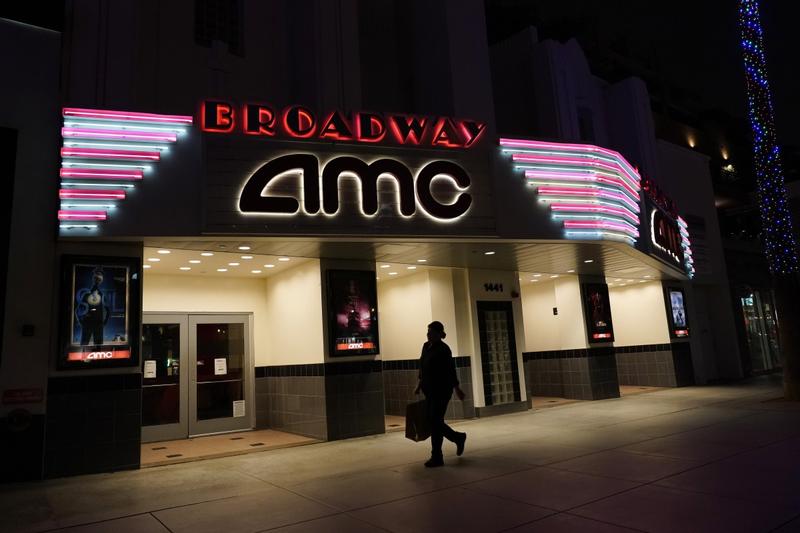As lockdowns force people inside, the way we treat ourselves takes a turn
 A father and his daughter attend a drive-in movie screening in a parking lot in Boston on July 8. (STEVEN SENNE / AP)
A father and his daughter attend a drive-in movie screening in a parking lot in Boston on July 8. (STEVEN SENNE / AP)
With theaters operating at reduced capacities or closed across the United States, cultural activities canceled and more people shifting to the digital world, analysts say the pandemic may change the entertainment industry forever.
As the COVID-19 outbreak keeps millions of Americans at home and searching for entertainment, different parts of the industry are striving to meet that demand through streaming services.
The Sundance Film Festival was held virtually this year-the first time since the 1980s. Films were available to stream via Sundance's digital platform across the country. Other major film festivals, including the Tribeca, New York and Toronto International, have offered films online and seen their reach considerably expanded.
Organizers of the New York Film Festival said attendance across virtual and drive-in screenings rose more than 9 percent over 2019 levels, and nearly 40,000 tickets for streaming were sold across all 50 US states as well as Washington DC, Puerto Rico and the US Virgin Islands, according to entertainment news website Deadline.
With concert venues shuttered, artists and musical institutions are taking their shows online. Justin Bieber livestreamed a New Year's Eve concert on Dec 31 in partnership with T-Mobile; country music singer Morgan Wallen released a new album with a livestream on Facebook and YouTube, according to a list compiled by Billboard that included hundreds of virtual music events from March 2020 to last month.
Twitch, best known as a video game streaming service, is a popular option for musicians to entertain their fans. Sessions, a live musicstreaming platform launched a year before the pandemic started, has grown rapidly in the past year.
"So while we never imagined the current situation, there's no question that COVID has catapulted virtual concerts to the top of mind for everyone in the industry," Tim Westergren, co-founder of Sessions, told PC Magazine. "It has dramatically accelerated the engagement of artists and their teams. We've had to work furiously to scale every part of our operations to keep up."
Another platform, Stageit, has been offering livestream shows for lesser-known artists for years, but only got popular when the country was under stay-at-home orders. The company told Variety that it made US$884,000 in two weeks in April 2020, compared with US$500,000 in all of 2019.
"This is not a short-term change. This is a shift in the way the business operates," Stephen White, chief executive officer of Stageit, told The Washington Post in a recent article. "It's not going back to the way it was before-livestreaming is definitely here to stay."
While the pandemic negatively affected almost every aspect of the entertainment industry over the past several months, "the video game industry's already high profile rose even more in the US economy and society", said a report from the Entertainment Software Association.
Video games have been a source of entertainment, stress relief and escapism for individuals social distancing in their homes, as well as an avenue for much needed social interaction through multiplayer networks, according to the report.
 A shopper walks past a closed AMC movie theater in Santa Monica, California, on Nov 19. The state imposed an overnight curfew to head off a surge in coronavirus cases. (MARCIO JOSE SANCHEZ / AP)
A shopper walks past a closed AMC movie theater in Santa Monica, California, on Nov 19. The state imposed an overnight curfew to head off a surge in coronavirus cases. (MARCIO JOSE SANCHEZ / AP)
US sales for video games and hardware increased 73 percent and 163 percent, respectively, in last April over the same month in 2019, according to market research company The NPD Group. Game publishers expect the sales boom they saw last year to stay.
"We expect that as new players engage and form in-game connections with existing or new friends, many of them will stay engaged for the long term, and we see this as a really big opportunity," Daniel Alegre, COO of Activision Blizzard, told Gameindustry.biz.
Studios and cinemas have been among those hardest-hit in the entertainment industry during the pandemic. After months of surging cases in California, several Hollywood guilds and labor unions are recommending that in-person production of television shows and independent films be temporarily halted.
Warner Bros and Netflix stopped filming a few shows last month, according to Variety. Universal also halted filming on six shows.
As the pandemic continues to rage across the US, and as California becomes the coronavirus epicenter of the country, the film industry has halted production again after a shutdown in March last year, when California issued a strict stay-at-home order.
State health officials authorized shoots to restart in June. Hollywood studios and entertainment unions agreed to a new set of safety protocols for TV and film crews in September, which have increased production costs for studios.
The global film and television industries are projected to lose US$160 billion in growth over the next five years, according to research by Ampere Analysis in May.
In the US, the world's largest moviemaking market, box office revenue for 2020 is estimated at US$2.3 billion, compared with US$11.4 billion in 2019, according to The Hollywood Reporter.
For the first time, China supplanted North America as the world's top moviegoing market last year, generating an estimated US$2.7 billion in ticket sales.
Theaters will be hardest hit. The global cinema market is expected to contract sharply for the next few years, with cinemas forced to close and major Hollywood releases delayed.
Cinema revenue is projected to drop globally by 65 percent to US$15.5 billion in 2024 from US$45.1 billion in 2019, according to consultancy firm PwC's Global Entertainment and Media Outlook 2020-2024.
While attendance has returned in some countries such as China and South Korea, the US, which leads the world in COVID-19 casualties, has failed to recover.
In the US, cinemas remain closed in Washington, Oregon, Illinois, New Mexico and Minnesota, while other states permit reopening by region or at reduced capacities, according to the CinemaSafe website.
The nation's more than 5,400 cinemas were abruptly closed in last March to slow the spread of the coronavirus. Fewer than half of the locations are open now, and some have gone dark permanently, according to the National Association of Theater Owners, which also warns that 70 percent of small to midsize movie theaters are at risk of shutting down without federal aid.
Studios have been forced to either release movies online at a loss or postpone their biggest films in the hope that the world will return to a pre-pandemic normal this year. Those big titles that have been sent to streaming platforms due to the pandemic include Warner Bros' Wonder Woman 1984 and Disney's Soul on Dec 25, as well as Mulan in September.
Disney's Black Widow is slated for May 7 this year, a year after it was first set to debut. It will be the first Marvel theatrical release to hit theaters since the start of the pandemic.
Sony has delayed most of its big releases to 2021 or 2022, while Universal experimented with paid digital debuts of movies such as Trolls World Tour.
Warner Bros has recently announced that it will make all of its 2021 films available on the group's HBO Max streaming service for one month on the same day they hit theaters. That's 17 movies, including some potential blockbusters, such as Godzilla vs. Kong, The Suicide Squad and The Matrix 4.
The move, called "dramatic" by industry analysts, is to boost subscriptions to HBO Max, which was launched in May in the US and charges US$15 a month.
John Stankey, CEO of AT&T, which owns Warner Bros, told an investor conference in December that the decision was a "win-win-win" for the company, its partners and consumers that fits current market trends and consumers' psyche amid the pandemic.
But the company's strategy has drawn criticism from filmmakers, with Christopher Nolan, director of Warner Bros movies such as Inception and Tenet, the most vocal critic.
"Some of our industry's biggest filmmakers and most important movie stars went to bed the night before, thinking they were working for the greatest movie studio, and woke up to find out they were working for the worst streaming service," he told The Hollywood Reporter.
"This is going to forever change how we look at the movie business," Hollywood producer Jason Blum told the Los Angeles Times. "It's the biggest thing to happen to the movie industry in my lifetime."
The lackluster box office results for those major releases seem to have validated the direct-to-consumer strategy. The US$200 million Mulan took in only US$66 million worldwide; Soul, which cost roughly US$150 million, earned just US$47 million worldwide; and Wonder Woman 1984, with a budget of around US$200 million, grossed US$132 million globally, according to Mojo.
On streaming platforms, those films delivered positive results. Nearly half of HBO Max subscribers watched Wonder Woman 1984 on the day of its release, and the streaming service saw the total viewing hours on that day more than triple in comparison to a typical day in the previous month, according to Warner Bros, without revealing specific numbers.
Disney has also seen rapid growth of its streaming platform Disney Plus. The company forecasts subscribers to reach 230 million to 260 million by 2024. It had expected the number to be 60 million to 90 million when the service was launched 14 months ago.
The "only real benefactor" of the pandemic has been subscription video-on-demand platforms such as Netflix, Disney Plus and Amazon Prime Video, said research firm Ampere, which projected a 12 percent gain in additional revenue growth over a five-year period for streaming services.
Media conglomerates are engaged in a fierce battle for streaming market share. Following the introduction of Disney Plus and Apple TV in November 2019, Warner Bros and NBCUniversal joined the race by launching HBO Max and Peacock respectively last year. Discovery Plus is the first new streaming service to launch this year.
Though Warner Bros executives said the company's streaming strategy is a "unique, one-year plan", many in Hollywood believe that the industry will never be able to go back to its old ways.
"US studios are fundamentally changing how they reach customers, with most launching or planning to launch their own streaming platforms. Films will reach huge numbers of viewers via streaming platforms," said a PwC report.


